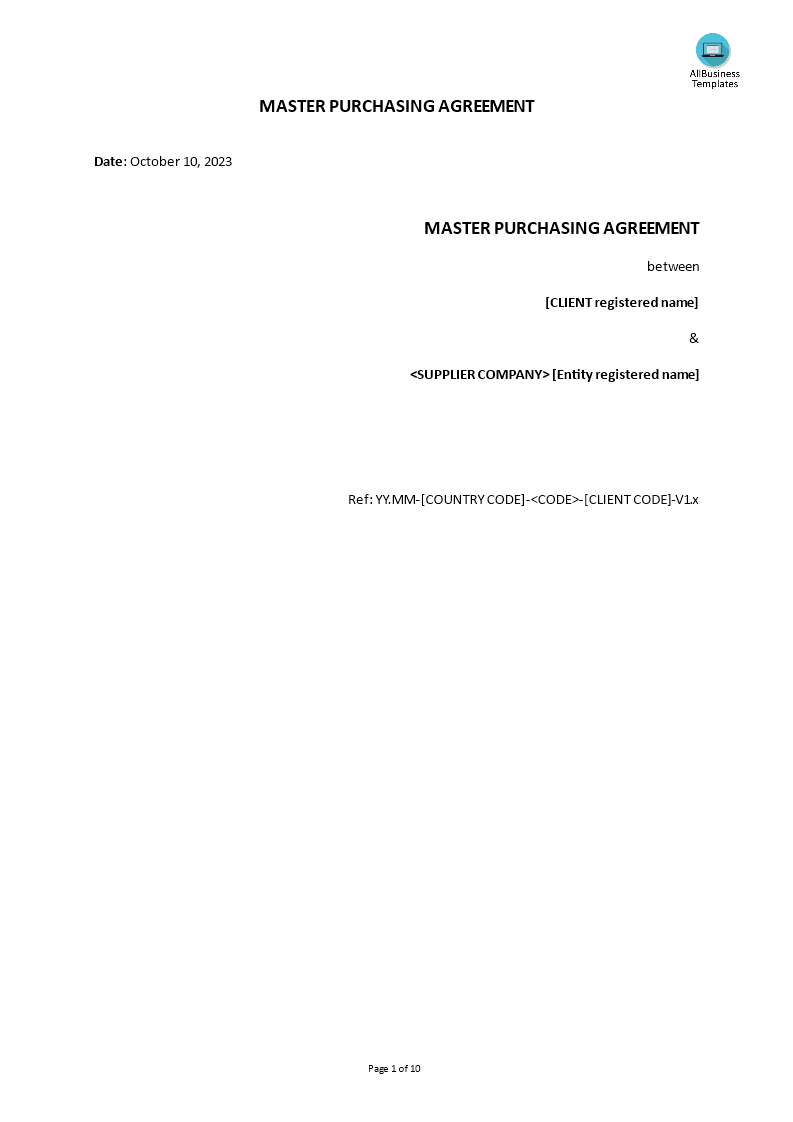Master Purchasing Agreement
Sponsored Link高级模板 保存,填空,打印,三步搞定!

下载 下载 How to draft a professional Master Purchasing Agreement? Why should you use a master purchase agreement? this Master Purchasing Agreement template now!
只有今天: USD 3.95
点击购买

可用的免费文件格式:
微软的词 (.docx)- 本文档已通过专业认证
- 100%可定制
- 这是一个数字下载 (36.89 kB)
- 语: English
- 付款完成后,您将收到包含该文件的电子邮件。
Sponsored Link
How to draft a professional Master Purchasing Agreement? Why should you use a master purchase agreement? Our master purchase agreement template is comprehensive and legally binding. It covers all the important aspects of the agreement, including payment terms, delivery and return of items, and dispute resolution. Download this professional Master Purchasing Agreement template now!
Using this easy-to-modify Master Purchasing Agreement provides you with the best example Purchasing Agreement to give you a head start and more time to focus on important subjects in the arrangement.
A Master Purchasing Agreement (MPA), also known as a Master Procurement Agreement or Master Supply Agreement, is a legally binding contract between a buyer and a supplier that outlines the terms and conditions governing their ongoing business relationship for the purchase of goods or services. MPAs are commonly used in B2B (business-to-business) transactions, especially when the parties expect to engage in multiple transactions over an extended period.
Here are some key features and components of a Master Purchasing Agreement:
- Parties Involved: Clearly specify the legal entities or individuals entering into the agreement. This includes the buyer (often referred to as the "purchaser") and the supplier (sometimes referred to as the "vendor" or "seller").
- Scope of Agreement: Defines the scope of products, goods, or services covered by the agreement. This section may include detailed descriptions and specifications of the items to be supplied.
- Term and Termination: Specifies the duration of the agreement, which can be for a fixed term or ongoing until terminated. Terms and conditions for termination, including notice periods and reasons for termination, are also outlined.
- Pricing and Payment Terms: Details how prices for goods or services will be determined and any applicable pricing mechanisms (e.g., fixed prices, price adjustments based on market conditions). Payment terms, such as payment schedules, invoicing procedures, and any discounts or penalties, are also included.
- Delivery and Shipping: Describes the logistics and shipping terms, including delivery schedules, responsibilities for shipping costs, and terms for risk and title transfer.
- Quality and Performance Standards: Sets out quality and performance standards that the supplier must meet, along with procedures for inspections, testing, and quality control.
- Warranties and Liabilities: Outlines any warranties provided by the supplier, limitations of liability, and procedures for handling defective or non-conforming products or services.
- Confidentiality: Includes provisions for the protection of confidential information shared between the parties during the course of their business relationship.
- Intellectual Property: Addresses issues related to intellectual property rights, ownership of any intellectual property created during the performance of the agreement, and licensing if applicable.
- Dispute Resolution: Specifies mechanisms for resolving disputes between the parties, such as negotiation, mediation, or arbitration.
- Governing Law: States the governing law that will apply in case of legal disputes, often the laws of a specific jurisdiction.
- Amendments and Modifications: Explains how the agreement can be amended or modified and the process for doing so.
- Compliance with Laws and Regulations: Requires both parties to comply with all applicable laws, regulations, and industry standards.
- Insurance: May require one or both parties to maintain certain types and levels of insurance coverage.
- Indemnification: Addresses responsibilities for indemnifying the other party in case of losses, damages, or legal claims.
- Notices: Specifies the methods and addresses for official communication between the parties.
- Entire Agreement: States that the MPA constitutes the entire understanding between the parties, superseding any previous agreements or understandings.
MPAs provide a framework for a long-term business relationship, helping to streamline future transactions and reduce the need to negotiate terms for each purchase separately. However, they should be carefully drafted and reviewed by legal professionals to ensure that they protect the interests of both parties and comply with relevant laws and regulations.
Download this Master Purchasing Agreement template now and enhance your business!
Do you need more procurement templates? AllBusinessTemplates.com provides many kinds of legal and business templates in the range of IT, Environmental, Startups, Marketing, Sales, Procurement, Law, Notary, Finance, HR, Auction, Logistics, Transportation, Maintenance Services, etc. Just search on our website and have instant access to thousands of free and premium business document templates, forms, letters, reports, plans, resumes used by professionals in your industry. All business templates are easy to find, crafted by professionals, ready to use, easy to customize, and intuitive.
DISCLAIMER
Nothing on this site shall be considered legal advice and no attorney-client relationship is established.
发表评论。 如果您有任何问题或意见,请随时在下面发布
相关文件
Sponsored Link
